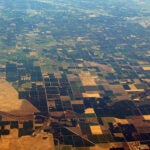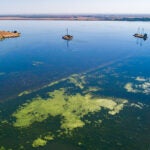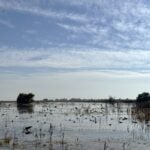This blog is co-authored by Sue Ruiz (Education Manager, Self-Help Enterprises), Chris Freimund (Director of Development, Watershed Progressive), and Laura Dubin, Rural Community Assistance Corporation
During a rainy Saturday in Visalia, graduates from the Water Leadership Institute (WLI) gathered for an alumni reunion. It only seemed fitting that alumni congregated to discuss solutions to water challenges in an area that historically suffered from drought and recently suffered from severe flooding.
Co-hosted by the Rural Community Assistance Corporation (RCAC), Self-Help Enterprises (SHE), and Environmental Defense Fund (EDF), the gathering was meant to foster a support network for community water leaders and influence the future of the WLI. The alumni reunion also included local organizations that work to engage communities to promote equity and water resilience, including the Community Water Center (CWC), Watershed Progressive, and Linguistica Interpreting and Translation.Through various activities and conversations, alumni stressed the importance of collaboration in their work and the value of the group’s diversity. They discussed creating solutions to the most pressing water challenges, such as groundwater contamination and depletion, as well as the urgency to build resilience to both droughts and flooding. Many WLI alumni shared that solutions had to involve the communities on the front lines, those first impacted by water challenges. Work must focus on engaging and investing in those communities to empower them to work alongside water experts.
Alumni felt the need to create support systems and safety nets that advance water equity for people across California. Community leaders must be at the center of the effort, shaping resilience strategies and being represented in local decision-making bodies. They also need assistance in bridging the gap between them and the agencies managing water resources.
Throughout the reunion, additional themes emerged and highlighted the specific impacts of the alumni’s work.

Laura Dubin and Kim Bennett (RCAC), Mike Myatt (EDF), Chris Freimund (Watershed Progressive) and Jusneet Boparai (SHE)
Speeding up access to safe water
Today, about one million Californians lack access to safe and affordable drinking water. Some services have improved through state funding secured with technical assistance from organizations like SHE and RCAC and the work of persistent community members. But improvement is limited and often slow – it is not uncommon for one facility improvement to take 10 or more years to come to fruition.
Two WLI alumni were recognized for advocating for quicker action and pushing for regional solutions to address drinking water contamination and improve community mobilization in the Central Valley. Sandra Garcia and Jesus (Tutuy) Montes were recently awarded the CWC’s Water Justice Award for their work through the AGUA Coalition (la Asociación de Gente Unida por el Agua/Association of People United for Water), a grassroots coalition of residents and allies dedicated to advancing the Human Right to Water in the San Joaquin Valley and Central Coast communities.
Partnering with their impacted communities
Many WLI alumni have been directly impacted by polluted water in their homes and communities, including high concentrations of nitrates, arsenic, and lead. In addition, they have had wells go dry or been evacuated from their homes due to flooding.
Alumni also expressed worries about possible changes to their communities in the Central Valley, including fears around farm workers losing jobs due to land going out of production and negative impacts to small agriculture-dependent businesses. These concerns highlight the importance of current efforts, such as Multibenefit Land Repurposing Programs (MLRP). This practice incentivizes some agricultural land to be voluntarily repurposed to uses that require little to no water and can create a more resilient landscape with recharge basins, restored floodplains, and community parks. WLI participants learn about the practice and how they can contribute to shaping land repurposing plans to benefit communities. As a result, alumni feel more prepared and empowered to participate in these dialogues.
WLI alumni are deeply engaged in grassroots efforts around these issues, helping to educate and support their families, neighbors, and affected communities. For example, Rosa Iganzu from El Nido (Merced County) is involved in relief efforts for communities impacted by recent floods. Diana Zeguarra and Maria Luisa Muñoz from Tulare County are working to promote groundwater awareness through infographics and flyers. Others, like Maria Fernanda Ridoutt and Gloria Ramirez, work closely with farmers to implement strategies to maximize water efficiency, redirect stormwater to recharge local aquifers, and be more resilient to climate change.
Addressing barriers to engagement is an investment
Representation and participation from residents are indispensable to creating durable and locally-relevant strategies for community water challenges.
While residents care deeply about these issues, participating in public meetings and processes can be challenging. Reyna Rodriguez, the founder of Linguistica Interpreting and Translation, shared, “There is a misconception that Spanish-speaking or non-English speaking communities are not showing up because they do not care, but that is not the case. Community members face countless barriers to engaging and feeling safe to express themselves, including working multiple jobs (many rely on hourly wages and can barely make ends meet), language barriers, or lacking childcare during meetings.
These issues are why Reyna and her team are committed to offering culturally-relevant live interpretation, translation, and outreach support to help agencies understand that in a state as diverse as California, offering translation services is not an expense but rather an investment. Addressing these needs is one way to help bridge the gap so communities and agencies can genuinely work together in decision-making processes.
WLI Alumni and NGO representatives participating in a Fish-bowl activity, reflecting on their experiences, learnings, and opportunities moving forward.
WLI alumni and facilitators stand before their “Wall of Dreams,” showcasing their hopes, dreams, and wishes for water in their communities.

WLI Alumni and NGO representatives participating in a Fish-bowl activity, reflecting on their experiences, learnings, and opportunities moving forward.
Preconceived ideas get in the way of collaboration
We need more opportunities for dialogue and relationship-building, where people from different organizations and backgrounds can listen and learn from each other. The future depends on people with varying perspectives collaborating, overcoming misconceptions, and realizing interconnectedness. Agriculture, drinking water, and environmental well-being are often pitted against each other in the media when in fact those interests are interdependent. Communities advocating for drinking water security depend on a healthy rural economy; growers depend on healthy farmworker communities and are worried about their ability to provide jobs and food; everyone depends on healthy and resilient water systems and landscapes.
Additionally, WLI alumni expressed feeling misunderstood. For example, a participant that relies on an irrigation specialist for a large local farm shared that people often think that individuals working in agriculture do not care about community drinking water concerns. But many care deeply and worry about their ability to provide jobs locally and keep their businesses afloat. Another participant mentioned how valuable it is to converse with people with differing opinions since people often surround themselves with those within the same circle and forget to think about how others are impacted by their decisions.
Participants feel hopeful about the future
As facilitators, we left the reunion full of hope, inspiration, and gratitude for the opportunity to learn from our alumni and the fantastic work they are leading. This gathering reinforced the importance of programs like the WLI and the need to grow and reach more communities.
It is sometimes hard to quantify the impact and value of programs like the WLI – the relationships built, insights gained, and creativity ignited. Sometimes it takes searching to see how participants apply what they learned from WLI in their work and communities. Yet, this program is making a tangible difference for water in California.
Our organizations are committed to continuing to facilitate spaces of connection, joy, vulnerability, and courage where participants can feel heard, draw on their wealth of knowledge, and build support and learning networks.
For more information about the WLI, contact Lucy Caine at lcaine@edf.org, Laura Dubin at ldubin@rcac.org, Sue Ruiz at suer@selfhelpenterprises.org, or Jusneet Boparai at jboparai@selfhelpenterprises.org. And watch for open registration for our next cohort of water leaders.


